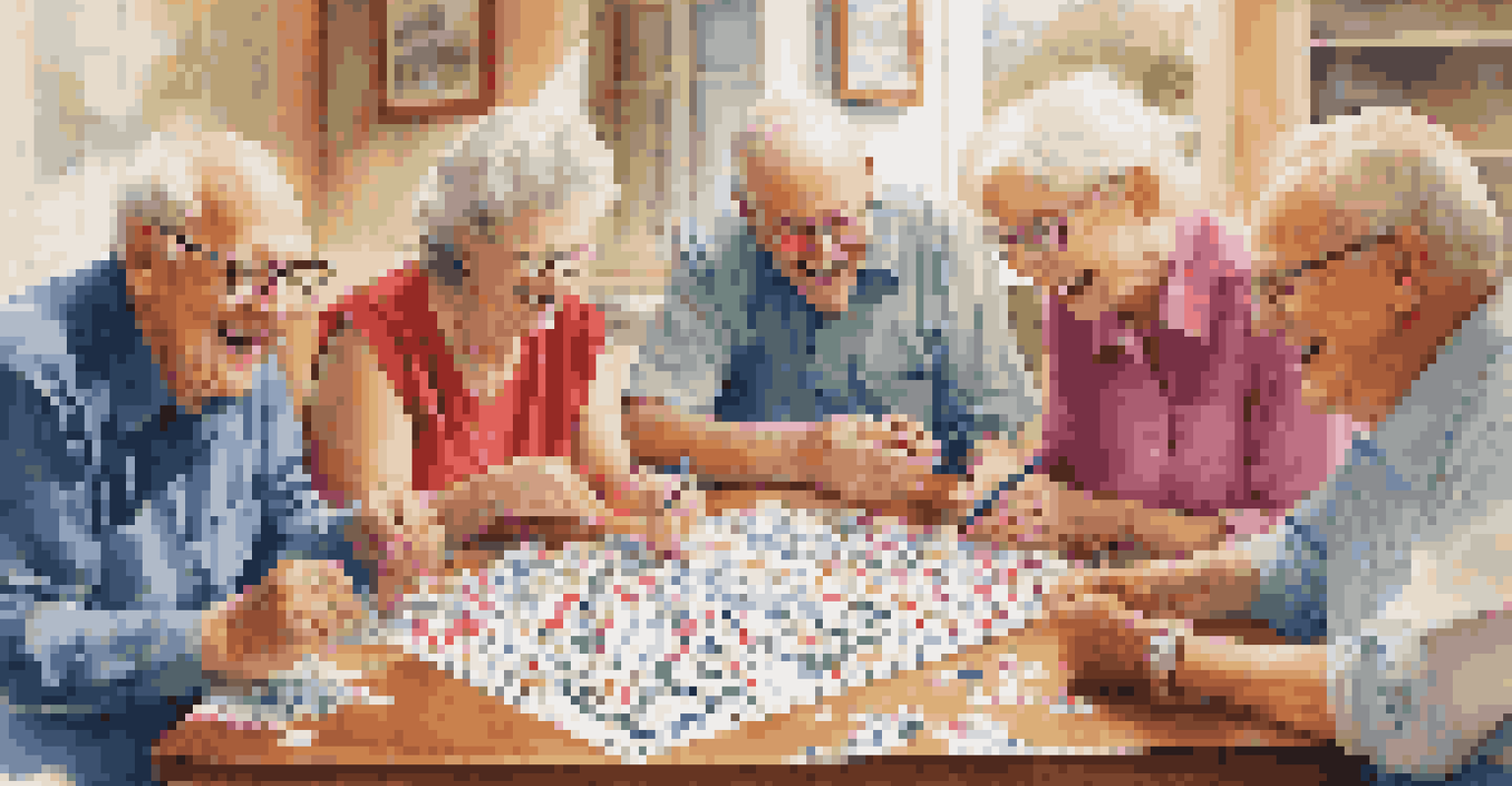The Impact of Puzzles on Aging: Keeping the Mind Sharp

Understanding Cognitive Aging and Its Challenges
As we age, our cognitive abilities can decline, affecting memory, attention, and problem-solving skills. This process, often referred to as cognitive aging, can be frustrating and worrisome for many individuals. It's essential to understand that while aging is inevitable, its impact can vary significantly from person to person.
The mind is like a parachute. It doesn't work if it is not open.
Research indicates that mental decline isn’t a guaranteed part of aging; rather, it's influenced by lifestyle choices, including diet, exercise, and mental stimulation. Engaging in activities that challenge the brain can help delay or even prevent cognitive deterioration. Puzzles offer a fun and engaging way to keep our minds active and healthy.
By incorporating brain games into daily routines, older adults can work to maintain their cognitive abilities. This proactive approach not only fosters mental agility but also contributes to overall well-being, encouraging a more vibrant and fulfilling life.
The Science Behind Puzzles and Brain Function
Puzzles come in various forms—crosswords, Sudoku, jigsaw puzzles, and more—each targeting different cognitive skills. Engaging in these activities has been shown to enhance neuroplasticity, which is the brain's ability to form new connections and adapt throughout life. This adaptability is crucial for maintaining cognitive health as we age.

Studies have demonstrated that regular participation in puzzle-solving can improve memory, increase processing speed, and enhance problem-solving abilities. In essence, puzzles serve as a workout for the brain, promoting mental fitness much like physical exercise benefits the body. The more we challenge our minds, the stronger they become.
Puzzles Boost Cognitive Health
Engaging in puzzles can enhance cognitive abilities, memory, and problem-solving skills as we age.
Moreover, puzzles can also boost mood and reduce stress, creating a positive feedback loop that encourages continued participation. As individuals engage in these activities, they not only improve their cognitive skills but also enjoy the process, making it more likely they will stick with it long term.
Types of Puzzles Beneficial for Aging Minds
There are numerous types of puzzles that can aid in cognitive health, each offering unique benefits. For example, crossword puzzles enhance vocabulary and comprehension, while Sudoku promotes logical thinking and number skills. Jigsaw puzzles, on the other hand, improve spatial awareness and visual memory.
The greatest discovery of my generation is that a human being can alter his life by altering his attitude of mind.
Digital puzzles have also gained popularity, providing convenience and variety. Many apps are designed specifically for older adults, featuring user-friendly interfaces and customizable difficulty levels. These digital platforms allow individuals to engage with puzzles at their own pace, making it easier to incorporate them into daily routines.
Additionally, social puzzles, like collaborative crossword-solving or group jigsaw challenges, offer the added advantage of social interaction. Engaging with others while solving puzzles can foster connections, reducing feelings of loneliness and enhancing mental well-being in older adults.
The Role of Memory in Puzzle Solving
Memory plays a crucial role in puzzle-solving, as it allows individuals to recall information, recognize patterns, and make connections. When solving puzzles, older adults often utilize both short-term and long-term memory, which can help keep these cognitive processes sharp. This active engagement with memory can stave off some of the challenges associated with aging.
Moreover, the repetitive nature of certain puzzles can reinforce memory pathways, making it easier to retain information over time. For instance, regularly playing word games can enhance vocabulary and recall, creating a mental library that enriches conversations and daily interactions.
Social Interaction Enhances Benefits
Working on puzzles with others fosters social connections, which are essential for emotional well-being.
As older adults continue to engage their memories through puzzles, they not only enhance their cognitive abilities but also gain confidence in their mental skills. This sense of accomplishment can further motivate them to incorporate more brain-boosting activities into their lives.
Social Interaction and Puzzles: A Winning Combination
One of the often-overlooked benefits of puzzles is their ability to foster social connections. Whether it's joining a puzzle club or participating in family game nights, working on puzzles can bring people together, creating opportunities for interaction and bonding. These social engagements are vital for emotional health, especially in older adults.
Engaging in puzzles with others can lead to collaboration and communication, enhancing cognitive skills in a social context. Sharing strategies, discussing solutions, and celebrating victories can make the experience more enjoyable and rewarding. Plus, the laughter and camaraderie that comes from working together can uplift spirits and reduce feelings of isolation.
In essence, puzzles are not just solitary activities; they can serve as a bridge to stronger relationships. By incorporating social elements into puzzle-solving, older adults can enjoy the cognitive benefits while also nurturing their social lives.
Setting a Routine: How to Incorporate Puzzles into Daily Life
Establishing a routine that includes puzzle-solving can significantly enhance its benefits. Aim to set aside a specific time each day for puzzles, whether it's during morning coffee or as a relaxing evening activity. Consistency is key, as regular engagement is crucial for maintaining cognitive health.
Start with puzzles that match your skill level and gradually increase the difficulty as you grow more confident. This approach not only keeps you challenged but also prevents frustration, ensuring you remain motivated. Remember, the goal is to enjoy the process while reaping the cognitive rewards.
Routine is Key for Engagement
Establishing a regular puzzle-solving routine can significantly enhance mental fitness and overall enjoyment.
Additionally, consider integrating puzzles into family gatherings or social events. Making puzzles a group activity can enhance motivation and make the experience even more enjoyable. By sharing the joy of puzzle-solving, you can create lasting memories while keeping your minds sharp.
Conclusion: Embracing Puzzles for Lifelong Mental Wellness
In conclusion, puzzles offer a delightful and effective way to combat the challenges of aging. By engaging in puzzles regularly, older adults can enhance their cognitive abilities, boost memory, and foster social connections. The benefits extend far beyond mere entertainment; they contribute to a more vibrant and fulfilling life.
As you explore the world of puzzles, remember that variety is key. Experiment with different types of puzzles and find what resonates with you. Whether you prefer crosswords, Sudoku, or jigsaws, the important thing is to keep challenging your mind.

Ultimately, embracing puzzles as a part of your daily routine can lead to lifelong mental wellness. So grab a puzzle, gather some friends or family, and start enjoying the countless benefits that come from keeping your mind sharp!